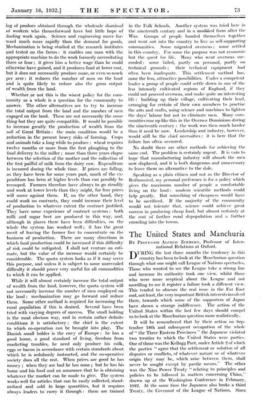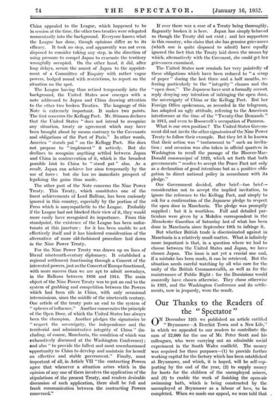The United States and Manchuria
Be PROFESSOR ALFRED ZIMMERN, Professor of Inter. national Relations at Oxford.
DURING the last three months the tendency in this country has been to look at the Manchurian question through what one might call League of Nations spectacles. Those who wanted to see the League take a strong line and increase its authority took one view, whilst those who were more sceptical about the League and not unwilling to see it register a failure took a different view. This tended to obscure the real issue in the Far East and, not least, the very important British interests involved there, towards which sonic of the supporters of Japan have shown a strange indifference. The action of the United States within the last few days should compel us to look at the Manchurian question more realistically.
It will be remembered that by their action on Sep- tember 18th and subsequent occupation of the whole of " the Three Eastern Provinces " the Japanese violated two treaties to which the United States were parties. One of those was the Kellogg Pact, under Article 2 of which the parties " agree that the settlement or solution of all disputes or conflicts, of whatever nature or of whatever origin they may be, which arise between theni, shall never be sought except by pacific means." The other was the Nine Power Treaty " relating to principles and policies to be followed in matters concerning China," drawn up at the Washington Conference in February, 1922. At the same time the Japanese also broke a third Treaty, the Covenant of the League of Nations. Since
China appealed to the League, which happened to be in session at the time, the other two treaties were relegated momentarily into the background. Everyone knows what the League has done, though opinions differ as to its efficacy. It took no step, and apparently was not even disposed to consider taking any step, in the direction of using pressure to compel Japan to evacuate the territory wrongfully occupied. On the other hand, it did, after long delays, secure the assent of Japan to the appoint- ment of a Committee of Enquiry with rather vague powers, hedged round with restrictions, to report on the situation on the spot.
The League having thus retired temporarily into the background, the United States now emerges with a note addressed to Japan and China drawing attention to the other two broken Treaties. The language of this Note is extremely important. It makes two points. The first concerns the Kellogg Pact. Mr. Stimson declares that the United States " does not intend to recognize any situation, treaty or agreement which may have been brought about by means contrary to the Covenants and obligations of the Pact of Paris." In other words, America " stands pat " on the Kellogg Pact. She does not propose to " implement " it actively. But she declines to recognize anything settled between Japan and China in contravention of it, which is the broadest possible hint to China to " stand pat " also. As a result, Japan can achieve her aims temporarily by the use of force : but she has no immediate prospect of legalizing the gains thus made.
The other part of the Note concerns the Nine Power Treaty. This Treaty, which constitutes one of the finest achievements of Lord Balfour, has been curiously ignored in this country, especially by the portion of the Press which is unsympathetic .to the League. Probably if the League had not blocked their view of it, they would more easily have recognized its importance. From this standpoint, the existence of the League has been unfor- tunate at this juncture : for it has been unable to act effectively itself and it has hindered consideration of the alternative of more old-fashioned procedure laid down in the Nine Power Treaty.
For the Nine Power Treaty was drawn up on lines of • liberal nineteenth-century diplomacy. It established a regional settlement functioning through a Concert of the interested powers, just as the Concert of Europe functioned, with more success than we are apt to admit nowadays, in the Balkans between 1856 and 1914. The main object of the Nine Power Treaty was to put an end to the system of grabbing and competition between the Powers which had been rife in China, with only occasional intermissions, since the middle of the nineteenth century. One article of the treaty puts an end to the system of " spheres of influence." Another consecrates the principle of the Open Door, of which the United States has always been the champion. Another pledges the signatories to " respect the sovereignty, the independence and the territorial and administrative integrity of China " (in- cluding, of course, Manchuria, the condition of which was exhaustively discussed at the Washington Conference) ; and also " to provide the fullest and most unembarrassed opportunity to China to develop and maintain for herself an effective and stable government." Finally, most important of all, in Article VII "the contracting Powers agree that whenever a situation arises which in the opinion of any one of them involves the application of the stipulations of the present Treaty, and renders desirable discussion of such application, there shall be full and frank communication between the contracting Powers concerned." If ever there was a case of a Treaty being thoroughly, flagrantly broken it is here. • Japan has simply behaved as though the Treaty did not exist ; and her supporters in this country, who claim that she has genuine grievances (which one is quite disposed to admit) have equally ignored the fact that the Treaty laid down the means by which, alternatively with the Covenant, she could get her grievances examined.
The United States now reminds her very pointedly of these obligations which have been reduced to " a scrap of paper " during the last three and a half months, re- ferring particularly to the " integrity " clauses and the " open door." The Japanese have sent a formally correct reply denying any intention of infringing the open door, the sovereignty of China or the Kellogg Pact. But her Foreign Office spokesman, as recorded in the telegrams, has adopted an ugly attitude, referring to the American interference at the time of the "Twenty-One Demands': in 1915, and even to Roosevelt's occupation of Panama.
What is our own position ? The United States Govern- ment did not invite the other signatories of the Nine Power Treaty to follow their example. But they let it be known that their action was " tantamount to " such an invita- tion : and occasion was also taken in official quarters in Washington to recall the passage of the Hoover-Mac- Donald communiqué of 1929, which set forth that both governments " resolve to accept the Peace Pact not only as a declaration of good intentions but as a positive obli- gation to direct national policy in accordance with its pledge."
Our Government decided, after brief—too brief— consideration not to accept the implied invitation, to ignore the reference to the Kellogg Pact, and simply to ask for a confirmation of the Japanese pledge to respect the open door in Manchuria. The pledge was promptly supplied : but it is worthless. Full and detailed par- ticulars were given by a Mukden correspondent in the Manchester Guardian of Saturday last of what has been done in Manchuria since September 18th to infringe it.
But whether British trade is discriminated against in Manchuria is a relatively small matter. What is infinitely more important is that, in a question where we had to choose between the United States and Japan, we have chosen Japan. The issue is not yet a crucial one and, if a mistake has been made, it can be retrieved. But the situation needs careful watching by all who care for the unity of the British Commonwealth, as well as for the maintenance of Public Right : for the Dominions would assuredly have chosen otherwise. They chose otherwise in 1921, and the Washington Conference and its settle- ments, now in jeopardy, were the result.



































 Previous page
Previous page